Are Raw Eggs Really Safe to Eat?
Posted on: April 19th 2022
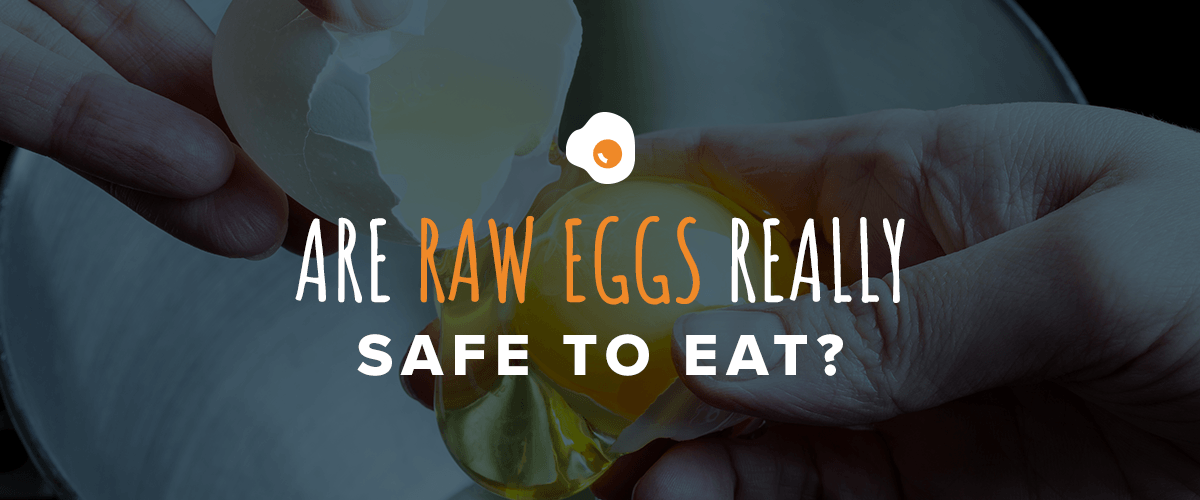
We’ve all heard the warnings that eating raw eggs can make you sick. However, when you’re faced with a bowl of delicious raw cookie dough, it’s hard to resist! In fact, manufacturers produce some of your favorite foods — ice cream, mayonnaise, and salad dressings, just to name a few — with raw eggs.
Considering how many recipes call for raw eggs, you may have started to wonder if getting sick from uncooked eggs is just an old wives’ tale or a real concern.
We’re going to get to the bottom of this mystery once and for all. Keep reading to find out the potential dangers of raw eggs as well as their surprising health benefits.
What’s the Big Deal About Raw Eggs?
The chances are good that you’ve consumed raw or undercooked eggs at some point. If they’ve never made you sick and you don’t suffer from an allergy or intolerance, you may be wondering why there are so many warnings against eating uncooked eggs.
Do all eggs pose a threat or just certain kinds? The answer comes down to understanding why and how raw eggs can make you sick.
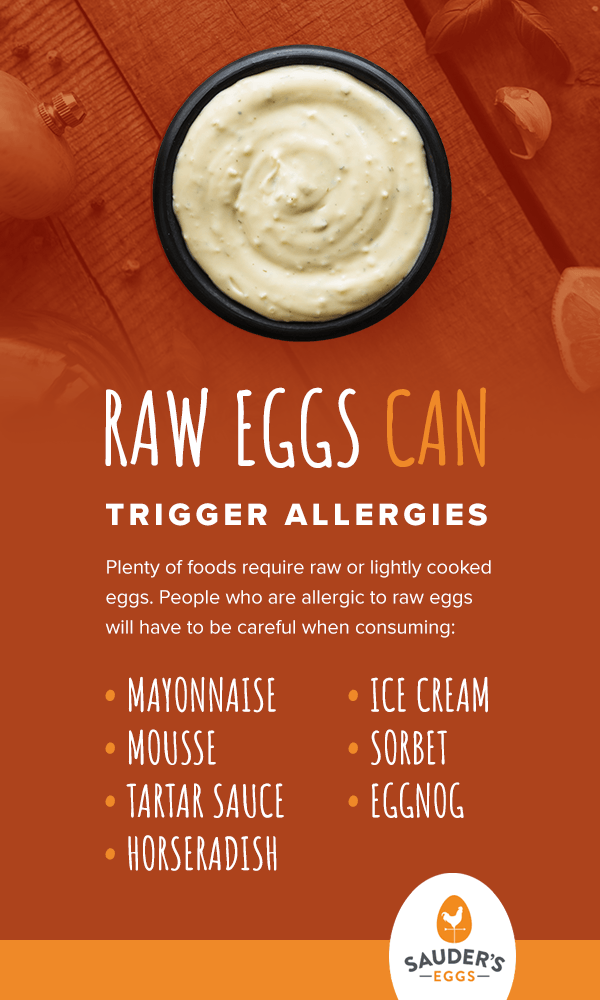
Raw Eggs Can Trigger Allergies
Egg allergies can range from mild to severe and cause a variety of uncomfortable symptoms. Nasal congestion, digestive issues, skin rashes, and hives are all familiar symptoms for those who live with egg allergies.
However, cooking eggs changes their protein structure, meaning someone with an allergy to raw eggs may be able to eat cooked eggs without any problems. You can cook eggs lightly or thoroughly, depending on your preference. How close to raw they can be before triggering a reaction is based entirely on each person’s individual tolerance and sensitivity.
Plenty of foods require raw or lightly cooked eggs. People who are allergic to raw eggs will have to be careful when consuming:
- Mayonnaise
- Mousse
- Tartar sauce
- Horseradish
- Ice cream
- Sorbet
- Eggnog
Raw Eggs Contain Bacteria
If you love to cook, you probably already know how important it is to wash your hands after handling raw chicken. Like uncooked chicken, eggs can carry bacteria known as salmonella. Eating food that carries salmonella can lead to salmonellosis, or salmonella poisoning, a common foodborne illness that affects the intestinal tract.
Salmonella can get on eggshells while the hens are nesting or when freshly-laid eggs come into contact with droppings. In cases where the laying hen is SE-positive, salmonella can also appear on the inside of an egg as it’s forming before the shell develops. However, the FDA requires egg producers to test their eggs and animal environments for salmonella contamination. This testing helps ensure that pullets are grown from SE-negative parents and reduces the risk of infection.
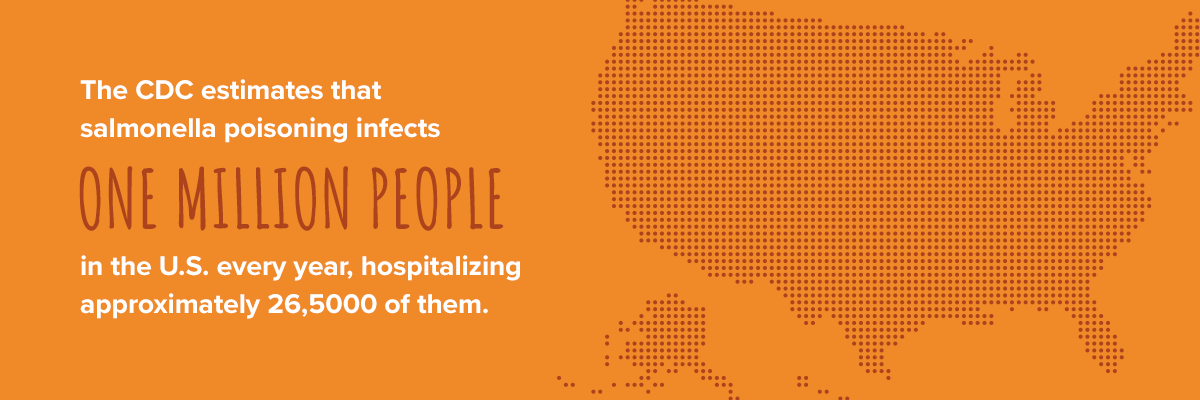
Raw Eggs and Salmonella
The CDC estimates that salmonella poisoning infects over one million people in the U.S. every year, hospitalizing approximately 26,5000 of them.
There is always a small risk of getting salmonella poisoning simply because the salmonella bacteria live on the outer eggshell. However, you can take comfort in knowing that various food safety processing guidelines are in place to help protect consumers from contracting this infection. Additionally, egg manufacturers use a thorough pasteurization process to help destroy harmful bacteria, which we’ll explore further in a later section.
Most producers also treat their commercialized eggs to eliminate salmonella bacteria. Untreated eggs must have an FDA warning on their label, so patrons are aware of the risks when consuming those particular eggs. With these food safety precautions in place, store-bought eggs are generally safe to consume.
How to Avoid Salmonella in Eggs
It’s important to take precautions to help minimize the risk of salmonella regardless of what kind of eggs you purchase. However, if you have any experience in the kitchen, you know there are many dishes that require lightly cooked eggs. These recipes still pose the risk of salmonella bacteria. Some of these include:
- Frittatas
- Omelets
- Poached eggs
- Hamburgers
- Curds
- Meringues
- Scrambled eggs
- Pancakes
- Custards
Avoiding these foods and thoroughly cooking your eggs will ensure that you don’t accidentally contract salmonella poisoning. These steps will help further reduce your chances of getting salmonella from raw eggs:
- Only purchase from producers that treat their eggs to eliminate salmonella.
- Always keep your eggs refrigerated.
- Cook your eggs thoroughly until firm.
- Don’t consume eggs that are past their expiration date.
- Discard cracked or dirty eggs right away.
- Wash your hands and any surfaces that come into contact with raw eggs.

What Are the Side Effects of Eating Raw Egg Whites?
If you do accidentally consume food with salmonella-contaminated raw egg, you may experience a few mild side effects. Common symptoms of salmonellosis include:
- Stomach cramps
- Diarrhea
- Fever
- Vomiting
- Chills
Like other bacterial foodborne illnesses, salmonellosis can take just a few hours to manifest. In some cases, the side effects associated with salmonella poisoning can begin within six hours after infection. In other cases, you may not see symptoms for several weeks.
Fortunately, symptoms usually resolve after four to seven days. The most important thing is to remember to drink plenty of water and stay hydrated while you’re recovering.
Can I Eat Runny Eggs?
There’s good news if you’re more interested in eating runny eggs than raw ones — as long as you follow some simple guidelines, partially-cooked eggs can be perfectly safe to eat.
The debate over how to make a perfect plate of scrambled eggs has circulated through the culinary world for years, though how you make them is entirely up to personal preference. Most Americans will tell you that scrambled eggs should be light, fluffy, and resemble soft curds. Across the Atlantic Ocean, however, French chefs will scoff and insist that this beloved breakfast dish should be creamy, loose, and silky.
This concept may seem odd, considering you often see the same caution with runny eggs that you do with raw ones. Considering how many people prepare French scrambled eggs and custards, you may be wondering whether runny and sunny side up eggs are actually safe to eat.
While scrambled eggs are a nutritious breakfast favorite, many people prefer a fried egg accompanied by a slice of toast. Either way, the truth of the matter is that your chances of getting salmonella poisoning from fried, poached, or runny eggs are similarly low across the board.
Since the salmonella bacteria typically live on the eggshell, you can feel safe using pasteurized or otherwise treated eggs. If you’re using fresh or otherwise untreated eggs, wash and sanitize them immediately before use.
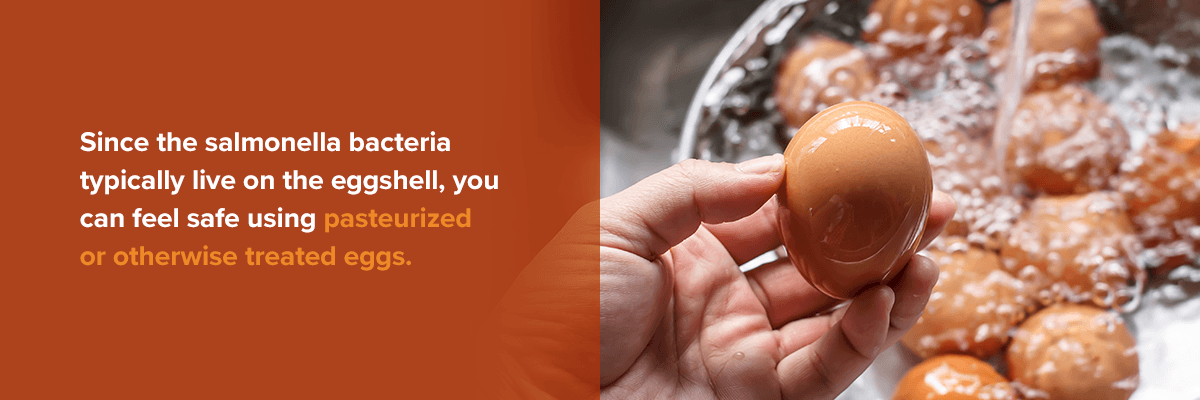
What Illness Can Raw Eggs Cause?
Most people who become sick from salmonella won’t require drastic measures like antibiotics or hospitalization as long as they take the time to rest and recover.
The most important part of recovering from salmonella is staying hydrated and monitoring your symptoms. Salmonella poisoning usually resolves on its own. However, you should seek medical care if you experience any of the following symptoms:
- Dehydration
- Vomiting that lasts more than two days
- Diarrhea that lasts more than two days
- Little to no urination or dark urine
- Bloody stools
- A fever higher than 102°F
If not treated with caution and care, it’s possible for salmonellosis to quickly transition from general food poisoning symptoms to a serious infection. Salmonella can even enter the bloodstream and turn into a fatal condition in rare cases.
However, this severe reaction to salmonella bacteria only occurs rarely and is one you can typically avoid by seeking medical attention if your symptoms worsen.
Raw Eggs and Biotin Absorption
While the risk of salmonella poisoning is undoubtedly something to be wary of, consuming raw eggs can also have other impacts on your health.
Egg yolks are a great source of biotin. Biotin, or B7, is an essential vitamin that helps your body convert food into energy, as well as strengthen your hair and nails. However, raw eggs also contain a protein known as avidin, which attaches to the biotin in the small intestine and stops your body from absorbing it.
Cooking the eggs eliminates the avidin. Although you would have to eat a considerable amount of raw eggs to become biotin deficient, it is still a risk to be aware of.
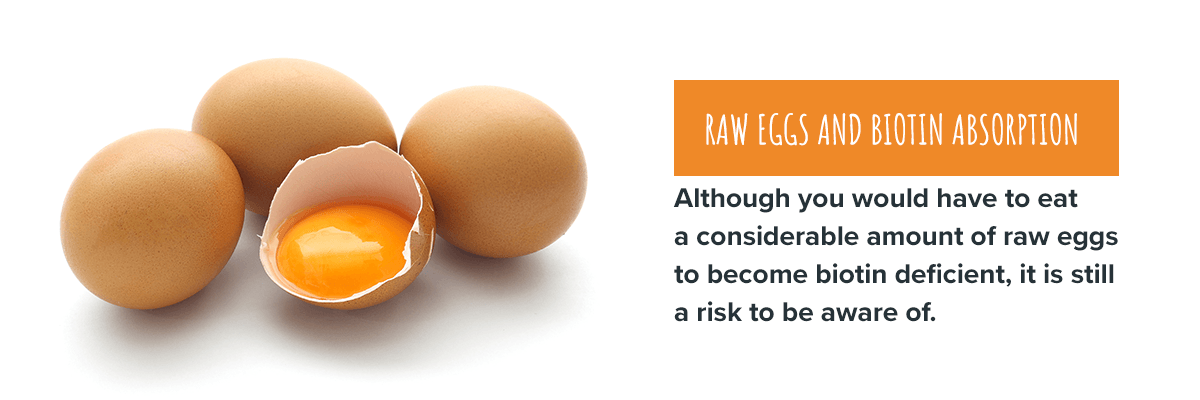
Who Is Most At Risk When Eating Raw Eggs?
Some individuals are more prone to infection than others. In these cases where high-risk individuals become infected with salmonella, they’re more likely to get critically ill.
Children
The first group at a higher risk of contracting salmonella due to raw egg consumption is children younger than 5 years old. In fact, of the people diagnosed with salmonella poisoning worldwide each year, about 40% are children under 5.
Most children with salmonella poisoning won’t need to see a doctor. Over-the-counter fever and pain relievers will help to relieve stomach cramping and break a fever. However, if their symptoms worsen, it’s important to seek medical attention for them immediately.
Older Adults
Older adults are another group at risk for more severe side effects related to salmonella infection. In general, individuals over the age of 65 are already susceptible to infections and diseases simply because their immune systems aren’t as strong as they once were.
While adults 65 and older may be more likely to develop a more serious infection, they won’t need to seek further medical treatment in most cases.
Compromised Immune Systems
Finally, people with compromised immune systems also face a higher risk of contracting foodborne illnesses of all kinds, including salmonella poisoning. Some of these individuals include those with:
- HIV
- Cancer
- Diabetes
- Transplanted organs
In addition to their compromised immune systems, people in this group may receive medication that inhibits their body’s ability to fight bacteria and germs, leaving them more vulnerable to infection.
Transplant recipients, in particular, may have also become resistant to the antibiotics that typically treat salmonella. This resistance means that as salmonella strains evolve, the traditional treatment methods become weaker with severe cases. However, those infected by the bacteria should still see a full recovery with appropriate antibiotic use.
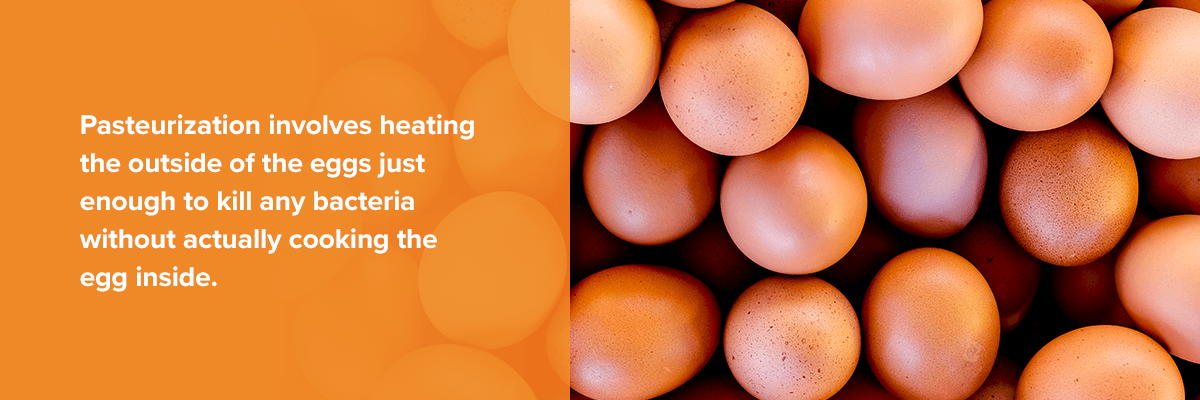
What About Pasteurized Eggs?
After reading about all the risks of consuming raw eggs, including the possibility of developing salmonella poisoning, you may be wondering if that carton of eggs is even worth having in your refrigerator. The good news is that you most likely have nothing to worry about with store-bought eggs.
Pasteurized eggs are the standard for commercialized eggs and egg products. Pasteurization involves heating the outside of the eggs just enough to kill any bacteria without actually cooking the egg inside. This process makes the eggs safe to use, whether you’ve cooked them to perfection or left them runny for a particular recipe.
The United States Department of Agriculture (USDA) grading system requires egg distributors across the U.S. to wash and sanitize every egg that passes through. This process ensures that the risk of contracting salmonella is as small as possible and also helps to kill any avian flu virus that may be present. While USDA grading is voluntary, state agencies still monitor distributors that choose not to useUSDA’ss grading services.
The combined efforts of the egg industry and federal and state governments have allowed for massive growth and improvement in egg farming and handling. Several government agencies work to uphold safety standards when it comes to commercialized eggs in the U.S., including the Food Safety and Inspection Service, USDA, Centers for Disease Control and Prevention, and the Food and Drug Administration. Their standards allow families all across the country to enjoy their breakfasts with peace of mind.
Raw Eggs and Pregnancy
It’s best to avoid eating foods that contain raw or partially cooked eggs during pregnancy. Along with the usual unpleasant side effects — vomiting, loose bowels, and dehydration — contracting salmonellosis while pregnant can develop into a more serious infection that may cause preterm labor or miscarriage. Certain types of foodborne illnesses can also pass to the baby. In the case of salmonellosis, the infection can lead to the risk of meningitis.
Pregnancy changes the immune system in many ways to adapt to and care for the baby in utero. There’s no telling how someone’s body will react when faced with different infections and it’s best to practice a healthy amount of caution with any foodborne illness.

Are There Any Health Benefits to Eating Raw Eggs?
One of the most iconic movie scenes in cinema history features Rocky Balboa drinking a glassful of raw eggs, yolks and all. This particular breakfast left both experienced athletes and typical moviegoers baffled and slightly disgusted.
Still, even with the knowledge of the dangers of salmonella and general warnings against eating raw eggs, the public couldn’t help but wonder — are raw eggs safe to eat? Are there more health benefits to eating eggs raw instead of cooked?
Eggs can be an incredibly nutritious part of a well-balanced diet. They’re packed with protein, vitamins A, D, E and B12, iron, folate, selenium, choline, lutein, and zeaxanthin.
When you cook eggs, you naturally reduce some of their available nutrients. Cooking eggs eliminates some of their vitamin A and antioxidants, and baking them for extended amounts of time may significantly reduce their vitamin D content. However, in addition to improving biotin absorption, cooking eggs also makes their protein more digestible. The truth of the matter is that there isn’t really a good reason to eat raw eggs, as there aren’t any notable benefits.
We definitely don’t recommend drinking a glassful of raw eggs, whether you’re preparing for a boxing title or simply pressed for time in the morning.
When Are Raw Eggs Safe to Eat?
At this point, you may be wondering whether it is ever safe to consume an uncooked egg.
Keep in mind that raw eggs are an ingredient used in many dishes, including some of your favorite foods. While there is always a slight risk of contracting salmonella poisoning, you most likely won’t get sick. Whenever you eat something that contains raw eggs, from homemade Caesar dressing to mayonnaise to cake batter, it’s best to eat it quickly.
Raw egg whites that are part of certain cocktail recipes and desserts are generally safe to eat when manufacturers have thoroughly pasteurized the eggs.
For the most part, your stomach acid will help eliminate the small number of bacteria that can appear in raw eggs, making them unlikely to give you food poisoning. However, the risk of a salmonella infection increases if pieces of eggshells remain in a mixture.
Pieces can find their way in if you crack the egg with too much force, driving shards of shell inside the egg. Passing the egg between the shell halves to separate the yolk from the egg whites can also pull loose shell chips into the egg. Always be careful when cracking your eggs, and avoid using the shell to separate them.
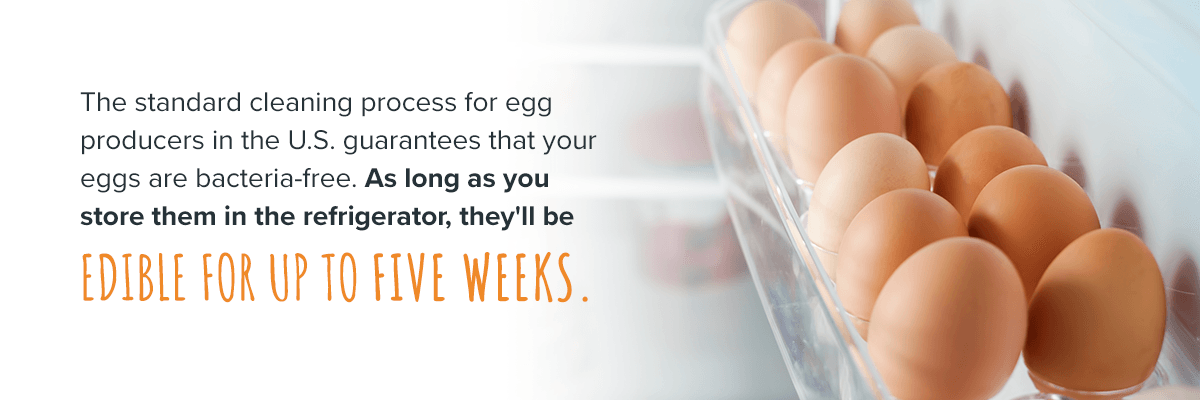
How to Enjoy a Safe Dish With Raw or Runny Eggs
If you’re still skeptical about trying steak tartare or enjoying chocolate mousse, don’t let the fear of salmonella stop you! The standard cleaning process for egg producers in the U.S. guarantees that your eggs are bacteria-free. As long as you store them in the refrigerator, they’ll be edible for up to five weeks.
Recipes that utilize raw eggs usually feature heat-free methods that neutralize the bacteria by “cooking” the egg. Try to seek out recipes that use a small amount of acid, like lemon juice or vinegar. Even though the acid won’t fully cook an egg, it will help to eliminate any potentially dangerous bacteria.
If you’re an especially adventurous snacker, you can eat your eggs raw. If you’ve selected them carefully, even raw eggs should pose only a minimal amount of risk.
The best way to make sure that all of your eggs and egg products are free of salmonella is to purchase them from a brand you know and trust.

Avoid Unpasteurized Raw Eggs With a Brand You Can Trust
At Sauder’s Eggs, we’re proud to offer a full range of eggs and egg products. We’ve fully pasteurized these egg products to prepare them for the frying pan.
Since our humble beginnings in the 1930s, we have worked hard to uphold our values of integrity and product excellence so you and your family can enjoy your favorite meals without ever second-guessing the quality.
From our organic and free range egg cartons to our ready-to-eat hard-boiled eggs, all of our products come from farms that uphold the highest standards of cleanliness.
Use our online store locator to shop forSauder’s Eggs today!
